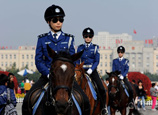
Vying for distinction
However, despite the ambition, the explosion of music shows this year and the fact that they are all Chinese versions of foreign originals underscore the inevitable problem of duplication and lack of original ideas for The Voice of China and its rivals.
Right now besides The Voice, which audiences already know originated from The Netherlands, other international copies include Chinese Idol, an obvious re-packaging of American Idol, and China's Strongest Voice, which is an adaptation of Britain's The X-Factor.
To distinguish themselves from the others, each of these music shows is trying their best to project their own unique style. For example, apart from its swivel chairs and "blind listening," The Voice of China chose to select their candidates by sending music experts all across the country scouting in places like bars, professional music schools or performance troupes.
Meanwhile, the program underscores the teacher-student connections as a selling point to touch audiences.
And in Chinese Idol, not just the music talent, but the look of the candidate also matters since the show is looking for someone with the potential to become a pop star.
The strategy used by China's Strongest Voice is to show the background training stories and pictures of contestants to both inspire and draw empathy from audiences.


















 White angels in Chongqing South West Hospital
White angels in Chongqing South West Hospital


![]()
